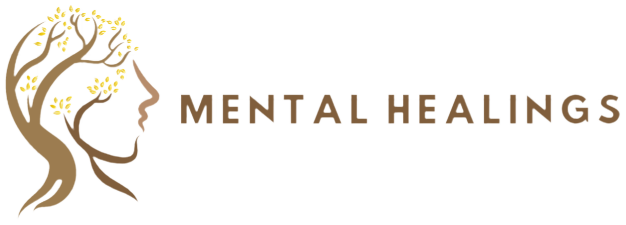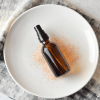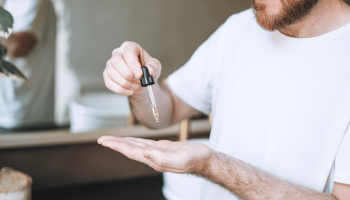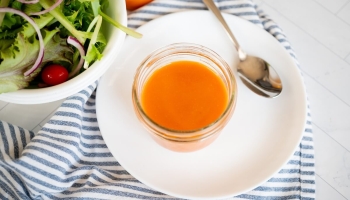
[ad_1]
Table of Contents[Hide][Show]
If you’ve ever had a sinus infection, you know how miserable it can be! The congestion, relentless pressure, and struggle to breathe can leave anyone feeling drained. While medical interventions are sometimes necessary, natural remedies can help. Here are some supportive home remedies for sinus infections.
What Are Sinus Infections?
A sinus infection (sinusitis) is caused by inflammation or infection within the bones around the nose and eyes. These mucus-lined cavities help trap and remove foreign particles and bacteria from the nasal passages. But if the sinuses become infected or inflamed, it can cause uncomfortable symptoms.
There are several different types of sinusitis:
- Acute Sinusitis: This is a short-term sinus infection, usually lasting less than 4 weeks. It’s often due to a viral upper respiratory infection like the common cold. Sometimes it’s caused by a bacterial sinus infection.
- Subacute Sinusitis: Subacute sinusitis is resistant to treatment and lasts about 4 to 8 weeks. An unresolved acute infection can lead to a subacute sinus infection. It can also come from other underlying factors.
- Chronic Sinusitis: Chronic sinusitis lasts for 8 weeks or longer. It often creates persistent symptoms like a stuffy nose, facial pain, a runny nose causing nasal drip, and a reduced sense of taste or smell.
- Recurrent Sinusitis: This type involves 3 or more episodes of acute sinusitis over a year. There are symptom-free intervals between flare-ups.
Worsening symptoms usually send people to their primary care physician. They may then refer to an otolaryngologist (ear, nose, and throat specialist).
Symptoms of a Sinus Infection
Symptoms of sinusitis can vary in severity and duration depending on the type and what’s causing it. Here are common symptoms associated with sinus infections:
- Nasal congestion (stuffiness)
- Postnasal drip
- Sore throat
- Facial pain or pressure
- Sinus congestion
- Sinus pressure
- Sinus headache
- Sinus pain
- Ear pressure or fullness
- Tooth pain and bad breath
- Reduced sense of smell or taste
- Fatigue
- Low-grade fever
What Causes Sinus Infections?
Many factors can lead to a sinus infection, including infections, allergies, and structural issues in the nose and sinuses. Here are some common causes of sinusitis:
- Viral infections: Viral infections are the most common cause of acute sinusitis. The common cold or flu can lead to inflammation and congestion in the nasal passages and sinuses.
- Bacterial infections: While less common than viral infections, bacteria can also lead to sinusitis. An untreated viral infection can lead to bacterial infections. Common bacteria involved in sinus infections include Streptococcus pneumoniae and Haemophilus influenzae.
- Allergies: Allergies to pollen, dust mites, mold, and animal dander can trigger allergic rhinitis. The inflammation and swelling of the nasal passages hinder proper drainage. If left untreated, allergic rhinitis can lead to chronic sinusitis.
- Nasal Polyps: Nasal polyps are noncancerous growths within the nose. They can block the nasal passages and sinuses, leading to chronic sinusitis. They’re often associated with allergies and recurrent sinus infections.
- Deviated Septum: A deviated septum refers to a shift in the partition separating the two nasal passages. A deviated septum can obstruct drainage, increasing the risk of sinus infections.
- Gastroesophageal Reflux Disease (GERD): GERD is a condition where stomach acid flows back into the esophagus. The acid can irritate and inflame the throat and nasal passages, contributing to sinusitis.
- Tooth infections: Infections in the teeth or upper jaw can spread to the sinuses, causing sinusitis.
- Waterborne pathogens: Swimming and diving can introduce pathogens into the nasal passages. The resulting irritation is “swimmer’s sinusitis.”
Certain conditions that weaken the immune system can increase susceptibility to sinus infections. Examples include HIV/AIDS and taking immune-suppressing medications.
Conventional Treatment Options
Treatment for sinusitis depends on the cause and how long you’ve had it. Here are typical treatment options for sinusitis depending on the type.
Acute Sinusitis: An acute sinus infection often resolves on its own, but doctors may prescribe antibiotics or steroids for chronic sinus infections. Many people also opt for over-the-counter (OTC) medications to soothe symptoms.
- Nasal decongestants like antihistamines
- Pain relievers like ibuprofen and acetaminophen (Tylenol)
- Saline nasal sprays
Sometimes, a doctor may recommend surgery to address underlying structural issues. Nasal polyps or a deviated septum can create a blockage in the nasal passages. Some people may need surgery to open the passages.
Science-Backed Natural Remedies for Sinus Infections
Here are some science-backed natural remedies you can try. You can use several at once and do whatever works best for your situation.
Saline Nasal Rinse
A sinus rinse is also known as nasal irrigation. This salt water solution helps flush out the allergens, irritants, and other agents contributing to the infection. The salt helps soothe and moisturize the irritated sinus tissues. It also helps remove thick mucus from the nasal passages and sinuses. The result is less congestion and improved breathing.
The kids and I rinse our sinuses daily during cold and flu season for prevention.
Numerous studies show saline nasal rinses help relieve symptoms and improve the quality of life for those with sinusitis. A 2015 Cochrane review reported nasal irrigation is probably useful in relieving sinusitis. A 2021 clinical trial found adding licorice extract powder to the saline made it more effective.
To do a sinus rinse, use a saline solution made with sterile or distilled water and a saline packet. You can also prepare your own saline solution at home using a mix of salt, baking soda, and warm water. Common methods for sinus rinsing include a squeeze bottle or a nasal irrigator like a Neti Pot. It took me a while to try the Neti Pot but I’m glad I did because it’s not as bad as it sounds!
You just fill a Neti Pot with a solution and use it to flush the sinuses of allergens and irritations. I’ll sometimes add a few drops of colloidal silver to my Neti pot if I’m dealing with a sinus infection. You can also use herbal tea to rinse with, but be sure it’s very well strained and uses distilled water.
To use: You can buy pre-made saline packets or you can make your own. Dissolve 1 teaspoon of Himalayan or plain sea salt in a quart of boiled distilled water. Cool to body temperature before using. Then add to a Neti Pot and pour through one nostril, letting it drain out the other. Adding a pinch of baking soda to the neti pot helps prevent a burning feeling. Get full instructions here.
Precautions & Side Effects: Be sure to use sterile water (boiled or distilled) rather than water straight from the tap. That’s because tap water may sometimes have parasites you don’t want in your sinuses near your brain! A case of bacterial meningitis has also been reported from Neti Pot use.
Nasal Spray
Saline nasal sprays can provide moisture to dry nasal passages and help with symptom relief. They’re available over the counter and can be used as needed. The saline solution also helps to clear mucus and reduce congestion.
Colloidal silver spray may disrupt the bacterial biofilm that develops during sinus infections. In animal research, it breaks down the shield that protects bacteria from antibiotics.
Precautions & Side Effects: Not all Colloidal silver is created equal. A random test of colloidal silver products found several were ineffective or contaminated! This is the brand that I personally use.
Xylitol Nasal Spray
Another option is a xylitol-based nasal spray. Xylitol is a sugar alcohol commonly used as a sugar substitute. It’s studied for its potential benefits in managing and preventing sinus infections. It particularly seems to help chronic sinusitis.
Xylitol interferes with the ability of some bacteria to stick to surfaces in the respiratory tract and sinuses. By reducing bacterial stickiness, xylitol may prevent these bacteria from causing sinus infections.
Bacterial biofilms can form in the sinuses, making infections more difficult to treat. Xylitol may help prevent the formation of biofilms, which can contribute to chronic sinusitis.
Precautions & Side Effects: Xylitol sprays are something I feel comfortable using (even for my kids). Although it’s not something we eat since it can cause digestive problems.
Steam Inhalation
Inhaling steam can help relieve congestion and reduce sinus pressure. Some research has found steam inhalation may provide short-term relief for acute sinusitis. You can add eucalyptus or peppermint essential oil for added benefit. For an even gentler option add some herbs, like peppermint and cinnamon to your hot water
Breathing the steam from a hot shower or a bowl of hot water can keep the sinuses moist. A humidifier or vaporizer can also help add moisture to the air, helping to relieve congestion.
Precautions & Side Effects:
Eucalyptus steam inhalation is generally considered safe for adults. However, be cautious with the hot water and steam to avoid burns, and ensure the water has cooled slightly before adding the essential oil. Avoid using eucalyptus and peppermint oil with young children, as they can be too strong for sensitive airways.
Essential Oils
Essential oils can help ease sinus infection symptoms and are antimicrobial to fight bacteria and viruses. They may also provide relief from congestion, inflammation, and discomfort. Here are some essential oils commonly used for sinus infections:
- Eucalyptus Oil: Eucalyptus oil is popular for clearing nasal congestion. It has a compound called cineole with anti-inflammatory and decongestant properties.
- Peppermint Oil: Peppermint oil is another excellent choice for relieving sinus congestion. It has menthol which provides a cooling sensation and can help open up the airways.
- Tea Tree Oil: Tea tree oil has antibacterial and antiseptic properties. It may help fight the underlying infection causing sinusitis.
- Cedarwood Oil: Cedarwood oil can help reduce inflammation in the sinuses and ease congestion. It has a mild, woodsy scent that some people find comforting.
- Lemon Oil: Lemon oil helps thin mucus and promote drainage. It has a refreshing, citrusy aroma that can be invigorating.
You can inhale essential oils by adding a few drops to a bowl of hot water, covering your head with a towel, and inhaling the steam. You can also use a diffuser to disperse the aroma throughout the room. If you want to apply them topically, dilute them with a carrier oil and apply them over the sinuses.
Precautions & Side Effects: Always dilute essential oils with a carrier oil (such as coconut or jojoba oil) before applying them to the skin. How much you dilute depends on the person, but a common dilution ratio is 1-2 drops of essential oil per teaspoon of carrier oil. My friend Heather has a really helpful list of baby and kid-safe essential oils here if you’re not sure which ones to choose.
Warm Compress
Applying a warm compress to your face over the sinus area can help relieve pain and pressure. Heat can help thin mucus and make it easier for it to drain from the nasal passages. It may provide relief from congestion and allow you to breathe more comfortably.
Bodywork can also help relieve sinus pressure and drain the sinuses. Dr. Temple mentions on the podcast how her daughter used craniosacral therapy to recover from sinusitis.
Precautions & Side Effects: Make sure your compress is warm, not hot, or it can burn the skin. It’s also important to make sure you use a clean cloth and wash it regularly to prevent the spread of germs.
Raw Honey
Raw honey has natural antimicrobial properties. I love taking a spoonful or stirring it into tea whenever I have a cough or sore throat. A 2020 controlled trial found Manuka honey worked better than saline rinses for certain types of sinusitis. Several studies have also found good results using honey rinses after sinus surgery for faster healing times.
Precautions & Side Effects: Ensure you’re using high-quality, pure, raw honey. Look for honey labeled as “raw” or “unprocessed” to maximize its health benefits.
Turmeric & Ginger
Curcumin, the active compound in turmeric, has anti-inflammatory and antimicrobial properties. Add turmeric to your diet or mix it with warm water to make a soothing drink. Ginger has natural anti-inflammatory properties and can help relieve symptoms. You can make ginger tea by steeping fresh ginger slices in hot water.
Precautions & Side Effects: Turmeric and ginger may interact with pharmaceutical drugs. If you’re on medications or have underlying medical conditions, consult a healthcare provider first. They can tell you about potential interactions.
Antimicrobial Herbs
I’ve already mentioned several on this list, but focusing on antibacterial and antiviral remedies can really help with sinus infections. Herbs like Houttuynia cordata and Andrographis have been used for thousands of years for bacterial and viral infections. And current science shows they’re effective for sinusitis.
Other herbs like elderflower are a gentle remedy for sinus infections. You can drink it as tea or use it as a (very well-strained) nasal rinse. A 2014 review reports elderflower can reduce swelling, improve sinus drainage, ease headache, and decrease nasal congestion.
Goldenrod is another common herb that’s useful for chronic sinusitis. The British Herbal Pharmacopeia even includes it in their recommendations. Goldenrod is naturally antimicrobial and anti-inflammatory and helps tighten leaky drippy tissues. If your nose is dry goldenrod should be mixed with more moistening herbs (like plantain), or skipped altogether.
Supporting Remedies for Sinus Infections
Here are some potential solutions for relieving pain and pressure and supporting the immune response.
Hydration
Staying well-hydrated is essential during a sinus infection. It helps keep mucus thin and supports overall health. Drinking plenty of fluids like herbal teas, broth, or warm water with lemon can provide additional relief.
Probiotics
Some research suggests probiotics work for sinus infections by providing overall immune support. They may also reduce the symptoms of sinusitis. When considering probiotics for sinus health, choose strains that research shows may help. Here are some probiotic strains studied for sinus infections.
- Lactobacillus plantarum: This strain shows potential for supporting immunity and reducing sinus infections. It may help modulate the body’s immune response to pathogens.
- Lactobacillus casei: Researchers are investigating this strain for immune support and respiratory health. It may help reduce the risk of upper respiratory infections.
- Lactobacillus paracasei: Research suggests this strain may enhance the defense against respiratory pathogens. It may potentially reduce the frequency and severity of sinus and upper respiratory infections.
When considering probiotics for sinus infections, choose a product with a combination of these strains. A healthcare provider can also recommend a probiotic for your needs and health goals.
Homeopathy
Homeopathic remedies are selected based on the principle of “like cures like.” The idea is that a substance that produces symptoms in a healthy person can treat similar symptoms in a sick person. Common remedies for sinusitis include:
- Allium cepa (made from onions)
- Kali bichromicum
- Pulsatilla
Others may also be helpful depending on the cause of your symptoms. Homeopathy is highly individualized. A trained homeopathic practitioner will assess your specific symptoms and medical history. They’ll also go over your constitution to select the most appropriate remedy.
Precautions & Side Effects: Homeopathic remedies usually have the best results when used under the guidance of a homeopath. Self-prescribing remedies can be ineffective unless you’re trained in homeopathy.
Plenty of Rest
Adequate rest is crucial for a robust immune system. Sleep is when your body carries out many essential immune functions. One of these is the production of immune cells and antibodies to help combat infections. Restorative sleep enhances the immune system’s ability to recognize and respond to viruses or bacteria. Plus it’s essential for fighting off a sinus infection.
Final Thoughts on Sinus Infections
These natural remedies can help ease symptoms and support recovery. However, they may not resolve the underlying infection. If your symptoms are severe, persistent, or worsen, consult a healthcare provider for diagnosis and treatment. Natural remedies are a great tool in our toolbox but it’s important to partner with trusted healthcare providers when needed too.
Have you ever had a sinus infection? What natural remedies have worked for you? Share with us below!
[ad_2]
Source link






